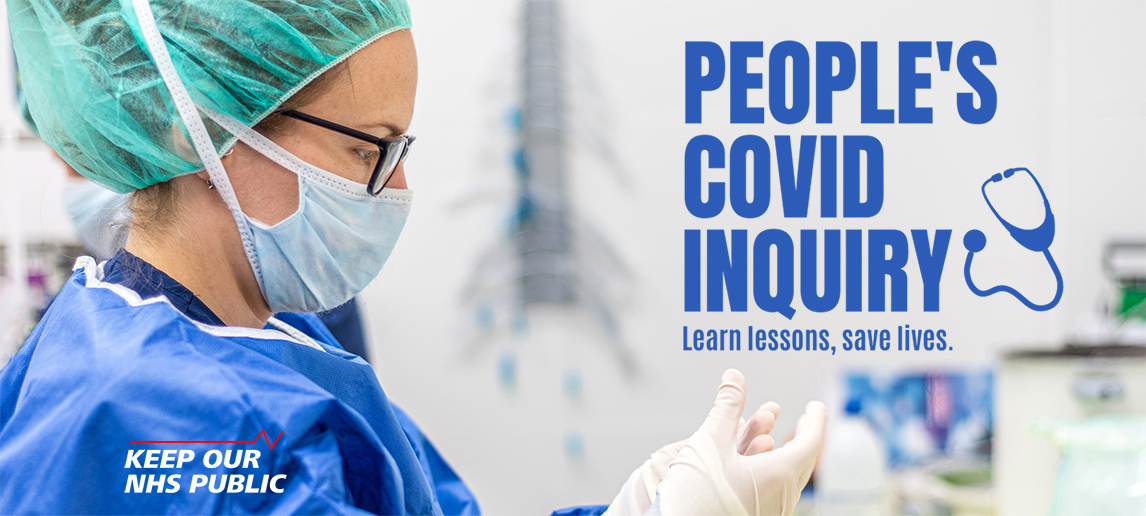Why ‘Keep Our NHS Public’ is launching a People’s Covid Inquiry

Dr John Puntis writes: The covid pandemic is ongoing and has already been a disaster that will have major long lasting adverse consequences.
Across the political divide there are few people who would even attempt to argue that the pandemic in England has been handled well, other than a misguided and ignorant minority of lockdown sceptics. With nearly 120,000 deaths including 29,000 in care homes, almost 900 health and care staff, and many other frontline key workers, we stand near the top of the world league table for deaths in relation to population, worse even than the United States. In addition, there has been a huge adverse impact on the psychological health of millions including children, many of whom will see their life chances reduced by the chaos around education. An enormous burden of ill health has also been neglected by an overhwhelmed NHS, forced to redeploy personnel and to suspend many non-covid related services. The problems of ‘long covid’ in survivors are likely to be considerable and require major investment in services to support this group of patients. Inequalities in society have been strikingly highlighted, with people from the BAME communities suffering disproportionately, together with those living in poverty or unable to work from home. The health and care workforce has made heroic efforts but will bear the mental scars for years to come. Whether they will even be allowed time for respite once spread of infection is brought under control remains in doubt and many are considering finding alternative employment or taking early retirement. Huge numbers of people have lost jobs or seen their income fall dramatically. Families have been separated from their loved ones, barred from seeing them in hospital or care homes, prevented from being with them at the time of death or mourning them properly with a funeral.
There is no evidence so far of lessons have been learnt
We might have expected lessons to have been learnt during what is now called ‘the first wave’, last spring. In fact, this has not been the case, with deaths during the second wave now exceeding those in the first. Although an effective ‘test and trace’ system was initially set as a precondition for relaxing the first lockdown, this requirement was abandoned on the basis of a false dichotomy between health and the economy. At the present time, a policy of virus suppression continues to be pursued in England despite evidence from countries such as New Zealand suggesting far better health and economic outcomes from a covid elimination approach. Large amounts of public money are being wasted on an ineffective privatised test and trace system, mass testing despite lack of evidence to suggest this is effective, and contracting out to private companies that have failed to deliver, for example on Personal Protective Equipment. While it became clear that crowding indoors, close proximity and poor ventilation all contributed towards spread of infection, ‘eat out to help out’, going to the pub, and mixing over Christmas were all encouraged with predictable and dire results. Even now staff are being put at risk because PPE guidance has not been updated in the light of new insights into viral spread, to say nothing of workplace restrictions given outbreaks such as in the Driver and Vehicle Licensing Agency office with over 500 cases including one death.
Is there even an appetite to learn lessons?
Looking at the above, it is difficult not to draw the conclusion that there is an unwillingness to learn lessons in case this is taken as an admission of guilt. Just as the Prime Minister talked of health staff having to make impossible decisions about which patients should or should not receive intensive care when demand outstrips resources, yet rejected the notion of helping formulate ethical guidelines and providing legal protection for those put in this situation. To do this, while entirely the right course of action, would be seen as an acknowledgement that government strategy had failed and that the NHS has been neither protected nor had coped. Notwithsanding, under pressure from many different sources the government has at least accepted that there is need for an inquiry, at the same time maintaining the fiction that it has done all the right things at the right time. In July, Johnson stated that ‘now was not the right time for an investigation but there would “certainly” be one “in the future” so lessons could be learned’. This was in direct response to pleas from the Covid-19 Bereaved Families for Justice group, who presciently remarked: “We also believe that a part of any inquiry must begin now to take fast action in order to prevent further unnecessary deaths should we encounter a second wave”. The Prime Minister went on to make it clear that there would be no inquiry until the pandemic was beaten, despite both MPs and scientists pleading for immediate action so the mistakes from the first wave were not repeated. In January 2021, after passing the official 100,000 deaths mark, he again reiterated that with NHS hospitals facing immense pressures, it would not be “sensible” to divert government resources away from the fight against Covid-19. The fact that an inquiry might assist in that fight seems not to have been considered, perhaps because he has been transferring his failures onto the public at large.
Why further prevarication is dangerous
It is clear that the government aims to avoid scrutiny and the inevitable criticism that will come its way for the management of the pandemic. Ministers therefore wish to delay any inquiry until such time in the distant future when this will have become both a largely academic exercise and pose them no threat. There are, however, powerful reasons why an inquiry should be a matter of urgency. Firstly, huge numbers of preventable deaths have already been shown to be the consequence of failing to learn lessons and change course. The pandemic is still raging, and who knows when it will end? Meanwhile, the death toll increases. The success of vaccination is by no means guaranteed and requires sufficient numbers of the population to be vaccinated in order to achieve herd immunity. Particular attention needs to be focused on vulnerable groups that are showing more evidence of vaccine hesitancy, yet currently there is not an inclusive approach that puts health inequalities at its heart. A possible scenario remains of infection being controlled in much of the country while remaining endemic in poor northern towns. How long vaccination will confer protection is unknown, and the threat of further viral mutations brings at least the possibility of a variant against which available vaccines will not be protective. All this dictates that a raft of measures to eliminate community transmission of infection (social distancing; find test, trace, isolate, support; work place safety, etc.) should be a main focus for government in addition to vaccine roll out. Finally, more pandemics will come. The 21st century had already seen SARS, H1N1, MERS, Ebola and Zika virus before SARS-CoV-2 caused covid-19. It is urgent that we plan for the next pandemic while getting out of this one, and think out how we develop our health and care services in order to repair the damage, make them resilient in the future, and provide the care and protection to the population that is the first duty of government.
A People’s Covid Inquiry
Keep Our NHS Public is convinced that it is in the public interest to learn lessons now so that any necessary actions can be taken sooner rather than at some unspecified point in the future – this we believe will save lives. We stand together with bereaved families calling for justice, the Patients Association insisting on knowing the extent of damage caused to non-covid care, health and care workers, trade unions and other campaigning organisations demanding that government faces up to its responsibilities. We also aim to give a voice to representatives from BAME communities, key workers and all those who have suffered and are calling for this to be recognised. To this end we are launching the People’s Covid Inquiry – to answer the questions the government lacks courage even to ask.
Support the Inquiry here
1 comment
One response to “Why ‘Keep Our NHS Public’ is launching a People’s Covid Inquiry”
Left Unity is active in movements and campaigns across the left, working to create an alternative to the main political parties.
About Left Unity
Read our manifesto
Left Unity is a member of the European Left Party. 
Read the European Left Manifesto
ACTIVIST CALENDAR
Events and protests from around the movement, and local Left Unity meetings.

Saturday 21st June: End the Genocide – national march for Palestine
Join us to tell the government to end the genocide; stop arming Israel; and stop starving Gaza!
More details here
Summer University, 11-13 July, in Paris
Peace, planet, people: our common struggle
The EL’s annual summer university is taking place in Paris.
More events »
GET UPDATES
Sign up to the Left Unity email newsletter.
CAMPAIGNING MATERIALS
Get the latest Left Unity resources.



I might stop being ‘vaccine hesitant’, if they would explain to me, in detail, why it is believed to be necessary to use a novel technique of introducing extraneous mRNA to force human cells to produce proteins that are not coded for by the cells own DNA? Why don’t they just deliver a suitably conformationally stabilised protein antigen directly into the bloodstream? I have never seen any convincing biochemical, or immunological, reason why this can’t be done, although I have been asking this question ever since I first discovered that mRNA ‘vaccines’ were being prepared. I have recently discovered that it is, now, being done – but no such vaccines have yet been made available (see https://www.thelancet.com/journals/lancet/article/PIIS0140-6736(21)00258-0/fulltext ).
Cuba have also developed a protein antigen vaccine that does not use the mRNA/virus vector, genetic engineering technique. It is called Sovereign II. (see https://www.counterpunch.org/2021/02/08/cubas-covid-19-vaccines-serve-the-people-not-profits/ ). But that vaccine will not be available in Britain, because it has been decided, quite understandably in the present circumstances, when the wealthier countries are taking most of the available vaccines for ourselves, that: “100 million doses of Sovereign II are being prepared, enough to immunize all 11 million Cubans, beginning in March or April. The 70 million remaining doses will go to Vietnam, Iran, Pakistan, India, Venezuela, Bolivia, and Nicaragua”.
But, why do they think it necessary to do less safety testing for novel mRNA vaccines than for more traditional types of vaccines? and how can they prove, scientifically, that mRNA vaccines will have no deleterious long-term effects?
Yes, we need an inquiry into how this pandemic has been mishandled by our government – and – while they are at it, they should investigate the possibility of future pandemics escaping from ‘biodefense’ labs, perhaps after dangerous pathogens have been created by being passed through ferret immune systems – and they should publish the full results of those investigations. Even if this pandemic didn’t originate in a ‘biodefense’ lab, future pandemics might do so. The result would be the same, or worse.
We could also learn valuable lessons from Cuba about how to help build the proper global public health system that we so desperately need. It would have to include abolition of patents on life-saving drugs and vaccines, abolition of the military-pharmaceutical-complex, and transfer of virologists, immunologists, and other biologists, from military-pharmaceutical control and funding, to the public health sector, where they belong, and where many of them would prefer to be working.